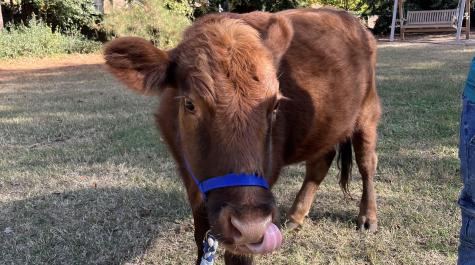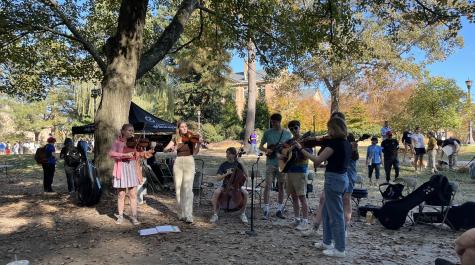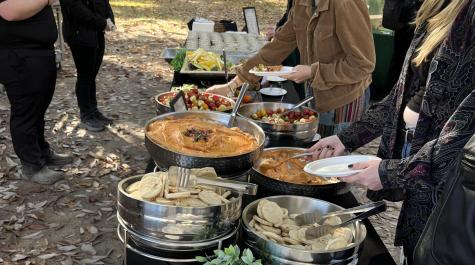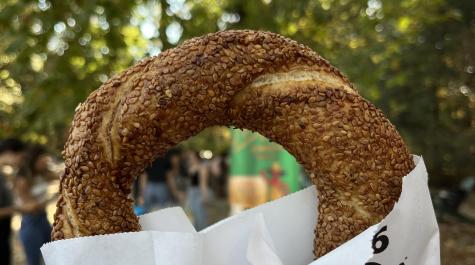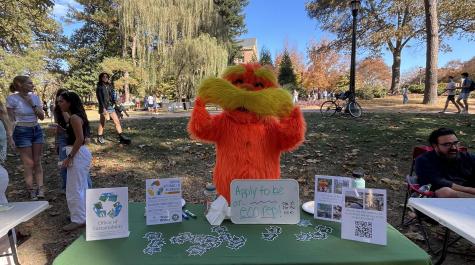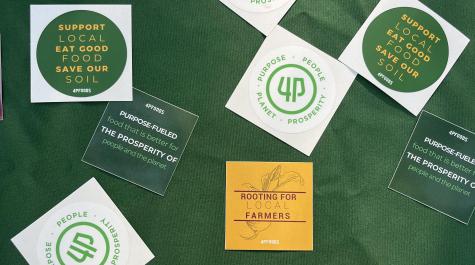Farm Fest Puts Food Sustainability on the Table
On Friday, November 8, William & Mary Dining hosted Farm Fest, an event where the College community was invited to learn about sustainable food systems and local food sourcing for the dining halls. The event took place in the Crim Dell Meadow and featured the Appalachian Music Ensemble, Everbowl, Ben & Jerry’s, a visit from the Lorax, and even a dwarf cow.
Annie is a blind dwarf cow from Life with Pigs, an animal sanctuary in Williamsburg. Ryan and Mallory Philips rescue farm animals and educate visitors on injustices animals face. Farm Fest attendees were welcome to pet Annie, and those who did earned an “I met a cow at Farm Fest 2024” sticker.
Present at the event was Jen Palmer, William & Mary’s account manager with 4P Foods. Aramark partners with 4P to source ingredients from 200 local producers and farmers along the eastern seaboard, many of which are underserved in the market due to their small scale. One of their titular four “P’s” is “planet”, showing 4P’s commitment to environmentally friendly food systems. “We try to source wisely and pick [farms] who are doing regenerative or sustainable practices, returning things to the soil and making the soil better than it was before they started,” Palmer said.
Dining Sustainability featured educational activities at their three booths led by student interns. One table displayed a log of which local farms grow ingredients used in campus dining halls. Local food sourcing supports local economies and lowers William & Mary’s carbon footprint. The catered hors-d’oeuvre and apple cider at Farm Fest, for example, were all locally grown. Aayla Kastning ‘26, a head intern for Dining Sustainability was excited to share with students some surprising local products. “Being able to say that even the Sadler ice cream comes from a local farm is really great,” Kastning shared.
Alisha Reaves ‘25 and Sarah Bigley ‘27 managed this station and were enthusiastic about getting to share Dining Sustainability initiatives with the community. “It’s been a really great experience to have a hand in all this sustainability,” Reaves reflected. “As an environmental science major, it feels like you’re doing something before you leave to go do something bigger.” Bigley was happy to see student involvement at Farm Fest. “It’s a great way to really connect with other student organizations … and all the local vendors,” Bigley said. “It’s just really exciting to see so many people interested in sustainability.”
Another booth offered tote bag tie-dying to Incentivize reusable bags, while its neighboring table allowed attendees to churn their own butter. Attendees were given locally sourced heavy cream in mason jars to shake and then strain so that only butter remained. Jackson Smith ‘25 shared why learning to churn butter can be a valuable educational experience. “Teaching people where their food comes from makes them more thoughtful about the process [of food production].”
Part of the Dining Sustainability internship is managing Dining Dollar vouchers at the Williamsburg Farmers Market, a service they also provided since there were booths from the Farmers Market at Farm Fest, including Crunch On! Snacks, Ninja Kombucha, and Anatolia Bar & Grill.
Jolly’s Mill Pond Farmstand is another vendor at the Williamsburg Farmers Market present at Farm Fest, but instead of selling their baked goods, the Jolly’s Mill Pond table focused on educating about combining livestock rearing to agricultural practices. Justin Luis Diaz, culinary and agricultural director at Jolly’s Mill Pond, taught attendees how Jolly’s integrates the production cycle of eggs and meat from their chickens to the production cycle of their produce. “What we find is that when we combine how we grow our food with how we raise our chickens, the food we produce is better, the chickens are happier and healthier, and we are able to regenerate and rebuild the soil and the environment at our farm,” explained Diaz.
Student organizations were also present at Farm Fest, including Food for All, a club that tackles food insecurity and issues in food access for William & Mary students, faculty, and staff. One of their sustainability initiatives is an effort to prevent food waste by redistributing leftover food from events.
Farm Fest was filled with community members enjoying good food and learning about sustainable food production. Seneca RiceWoolf ‘25, a head intern for Dining Sustainability, had the original idea for Farm Fest and was happy to see it come to fruition. “My favorite part is the list of vendors,” RiceWoolf said, “ … and also seeing students engaged with the dining process, because knowing where your food comes from is important.”














